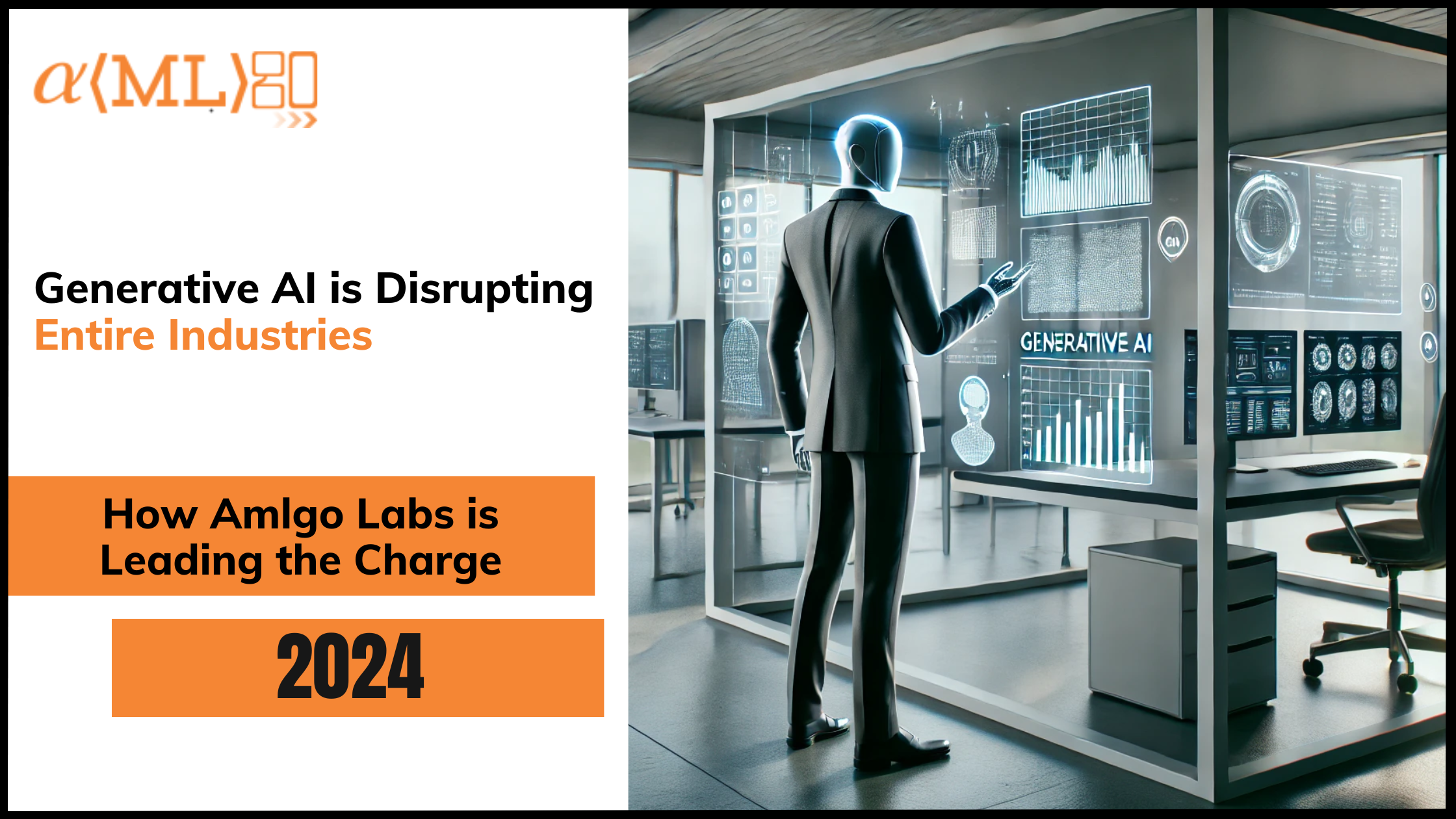
What is Generative AI?
Generative AI is a subset of artificial intelligence that creates new content like images, music, text, and code. Unlike traditional AI, which recognizes patterns and makes decisions based on existing data, generative AI generates new data by mimicking patterns from its training data. Powered by models like Generative Adversarial Networks (GANs) and Transformers, it has the potential to revolutionize industries by automating creative and complex tasks.
How Amlgo Labs Utilizes Generative AI in Our Work/Projects
At Amlgo Labs, we leverage generative AI to drive innovation and efficiency in various projects. Our applications of generative AI include:
- Financial Forecasting and Analysis
In the financial sector, precision and foresight are paramount. At Amlgo Labs, we deploy generative AI to synthesize extensive sets of financial data, allowing us to test algorithms and evaluate risks under a variety of scenarios without exposing real assets. This not only enhances the accuracy of our financial models but also significantly boosts our ability to forecast market trends and financial outcomes with a higher degree of reliability.
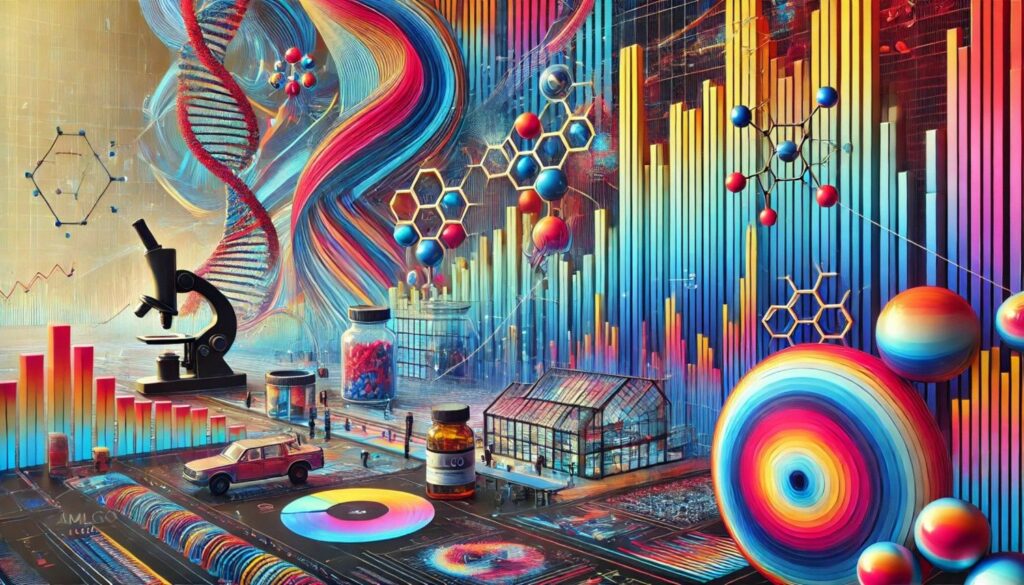
- Innovations in Healthcare
In healthcare, the stakes are incredibly high. Our generative AI initiatives are pivotal in synthesizing medical data, which serves as a crucial resource for research and training without compromising patient confidentiality. Furthermore, our AI-driven approaches are revolutionizing drug discovery by speeding up the design and testing of new molecules and treatments, making significant strides in medical innovation and patient care. - Manufacturing Optimization
Efficiency in manufacturing not only saves time and costs but also enhances product quality. Leveraging generative design, we optimize everything from automotive parts to consumer electronics, ensuring that each product not only meets but exceeds performance expectations while minimizing resource use. This application of AI not only leads to superior product designs but also promotes sustainability within manufacturing processes. - Tailored AI Solutions
Recognizing the unique challenges and needs of each industry, we provide bespoke AI solutions that align closely with our clients’ specific objectives. Whether it’s automating mundane tasks, enhancing customer interaction through personalized experiences, or fostering product innovation, our custom solutions are designed to propel businesses forward, ensuring they remain competitive and innovative in an ever-evolving market.
How Generative AI Can Change the Architecture of Current Systems
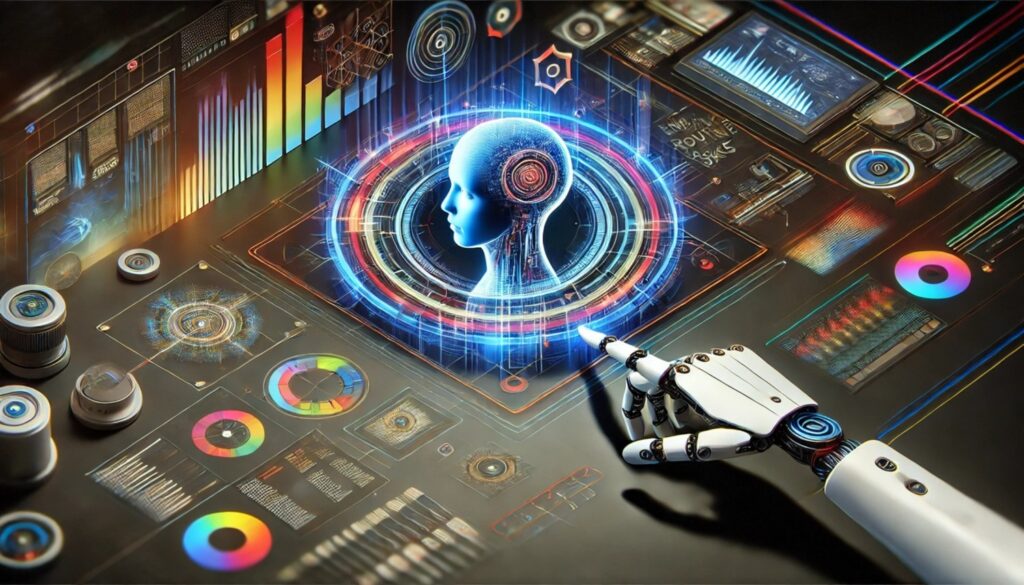
Generative AI has the potential to automate and enhance various applications across industries:
- Automation of Routine Tasks
Think of those repetitive tasks that eat up the bulk of your day—like drafting reports, crunching numbers, or even coding software. Generative AI steps in to handle these with ease, saving precious time so that people can focus on more creative and strategic endeavors. It’s like having an ultra-efficient assistant who never tires! - Enhanced Personalization
This technology isn’t just about automation, it’s also about personal touch. Generative AI analyzes data to create personalized experiences that resonate more deeply with users. From marketing campaigns that speak directly to your interests, to customer service that knows your history and preferences, it makes interactions feel more thoughtful and tailored. - Improved Decision Making
Imagine being able to predict various future scenarios before making a decision. Generative AI can model different outcomes based on existing data, helping leaders in finance, healthcare, and urban planning make choices that are informed and forward-thinking. It’s like having a crystal ball, but backed by data! - Innovation in Design and Manufacturing
In fields like manufacturing and product design, AI-powered tools are creating designs that are not only innovative but also optimized for performance and sustainability. This tech can find solutions that humans might overlook, making products better and processes more efficient.
Rules Amlgo Labs Follows While Working on GenAI Applications
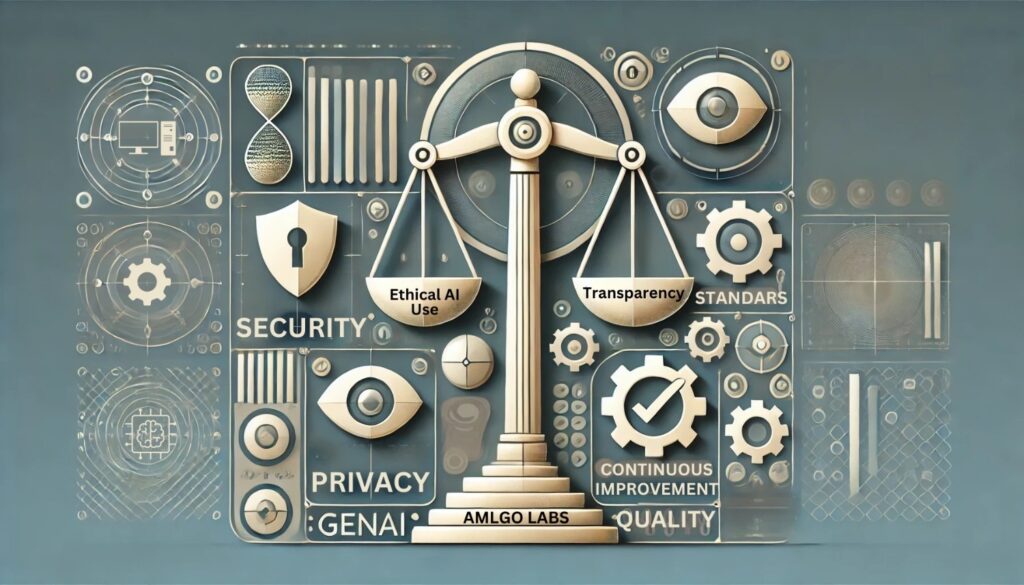
Amlgo Labs adheres to a strict set of guidelines to ensure the ethical and effective use of generative AI:
- Ethical AI Use
We are dedicated to ethical AI practices, rigorously ensuring that our generative AI applications promote positive outcomes without causing harm to individuals or society. This involves a steadfast commitment to avoiding the creation of misleading, biased, or harmful content. Our approach prioritizes the development of solutions that enhance human capabilities and foster well-being. - Transparency
Transparency is crucial in building trust and accountability in AI deployments. At Amlgo Labs, we strive to be clear about the inner workings of our AI models, the data they utilize, and the rationale behind their decisions. We ensure that all stakeholders, including clients and end-users, have a clear understanding of how our technologies function and the principles guiding their operations. - Privacy and Security
Protecting the privacy and security of data is paramount in our operations. We rigorously adhere to all relevant data protection laws and standards, ensuring that the data used by our AI systems is handled with the utmost care. We implement state-of-the-art security measures to safeguard sensitive information from unauthorized access and breaches, thus maintaining the confidentiality and integrity of the data we manage. - Continuous Improvement
The landscape of AI is continually evolving, driven by technological advancements and changing regulatory environments. We commit to ongoing monitoring and refining of our AI models to ensure they not only meet current standards of accuracy and fairness but are also robust against emerging threats and biases. This process of continuous improvement helps us to maintain the effectiveness and reliability of our AI solutions over time.
The Impact of Generative AI in Modern Days Industries
Generative AI is transforming numerous facets of our daily lives, industries, and societal functions through its advanced capabilities to create new content and automate complex processes. Its influence spans from the automation of mundane tasks to the enhancement of creative endeavours and the optimization of operational efficiencies. Let’s delve deeper into how this technology is being utilized, the mechanisms behind it, and the specific technologies that are driving its adoption across various sectors. Here are a few key areas where its impact is most noticeable:
- Creative Industries:

Generative AI is reshaping creative industries by enabling novel forms of artistic expression and innovating the way content is created, distributed, and interacted with. Here are some of the ways generative AI is impacting these industries:
- Art and Design:
AI tools are now capable of generating art, from painting to music composition. These tools use deep learning models to understand different artistic styles and generate new pieces that reflect learned styles or completely novel creations. In design, AI algorithms can help generate multiple iterations of a design based on set parameters, significantly speeding up the creative process and offering designers a range of options to refine and develop. - Film and Video Production:
In film, generative AI is used for everything from scriptwriting to post-production effects. AI can analyze scripts to suggest changes that might improve narrative structure or audience engagement. In post-production, AI can automate color correction, sound design, and even edit sequences to enhance the pacing of a film. - Video Games:
Generative AI is revolutionizing game design and development. It can generate dynamic game environments that adapt to player actions, create realistic NPCs with complex behaviors, and even develop entire levels or quests. This not only enhances the gaming experience but also extends the lifespan of games by providing ever-evolving challenges and scenarios. - Literature and Publishing:
AI is being used to write poems, novels, and even news articles. While it’s not replacing human creativity, it’s being used as a tool to augment the creative process. AI can suggest plot twists, develop character backstories, or propose edits to improve clarity and engagement in written content.
- Art and Design:
- Healthcare:

Generative AI’s impact extends into healthcare through the creation of synthetic data and the development of new medical treatments. It is making substantial strides in transforming healthcare by enhancing diagnostics, personalizing treatment plans, and improving patient care. Here’s a detailed look at its impact:- Enhanced Diagnostic Accuracy:
Generative AI has been instrumental in improving the accuracy of medical diagnostics. AI-driven systems analyze medical images, such as X-rays, CT scans, and MRIs, with a level of precision that often surpasses human capabilities. These systems can detect subtle patterns or anomalies that might be overlooked by human eyes, leading to early diagnosis of diseases such as cancer, neurological disorders, and heart conditions. - Personalized Medicine:
AI algorithms can analyze data from a patient’s medical history, genetic information, and lifestyle choices to tailor treatments that are specifically suited to their unique health profile. This approach not only improves the effectiveness of treatments but also minimizes side effects by avoiding a one-size-fits-all approach. For instance, in oncology, generative AI can help design personalized cancer therapies by predicting how different individuals will respond to various treatments based on their genetic makeup. - Automation of Routine Tasks:
Generative AI automates numerous administrative and clinical tasks in healthcare settings, such as scheduling appointments, managing patient data, and processing insurance claims. This automation reduces the administrative burden on healthcare professionals, allowing them to focus more on patient care and less on paperwork. Moreover, AI can generate comprehensive reports and patient summaries, aiding doctors in making informed decisions quickly. - Training and Simulation:
AI-driven simulations and training tools are revolutionizing medical education and ongoing professional training. Generative AI can create realistic 3D models and simulations of human anatomy, allowing medical students and professionals to practice procedures in a risk-free environment. This hands-on experience is invaluable in preparing medical staff to handle real-life situations more effectively.
- Enhanced Diagnostic Accuracy:
- Entertainment:

Generative AI is transforming the entertainment industry by creating new content, personalizing user experiences, and reshaping how content is produced and consumed. Here’s an overview of its impact:- Content Creation:
AI is now used to generate music, write scripts, and even create art. For instance, AI algorithms can compose music by learning from a vast array of styles and genres, enabling the creation of unique pieces that might be indistinguishable from those composed by humans. In filmmaking and gaming, AI can generate dialogues, plot twists, and entire narratives. This not only speeds up the creative process but also introduces new, innovative elements that may not occur in conventional content creation. - Personalization and Recommendation Systems:
Streaming platforms like Netflix and Spotify use generative AI to analyze user preferences and viewing or listening habits to recommend personalized content. This enhances user engagement by providing a tailored entertainment experience that keeps users coming back. The AI systems continually learn from feedback and interactions, refining the accuracy of their recommendations over time. - Virtual Reality and Augmented Reality:
Generative AI is crucial in developing immersive VR and AR experiences, which are becoming increasingly popular in gaming and interactive media. AI-generated environments allow users to experience highly detailed and interactive worlds. These technologies are also being used in virtual concerts and tours, providing fans with new ways to engage with entertainment. - Enhancing User Interactions:
AI-driven chatbots and virtual characters offer interactive experiences that engage users in a conversational manner. These AI characters can adapt their responses based on the interaction, providing a dynamic engagement that enhances the entertainment value. For example, video games employ AI-driven non-player characters (NPCs) that react intelligently to player actions, creating a more engaging and realistic gaming experience.
- Content Creation:
- Finance:
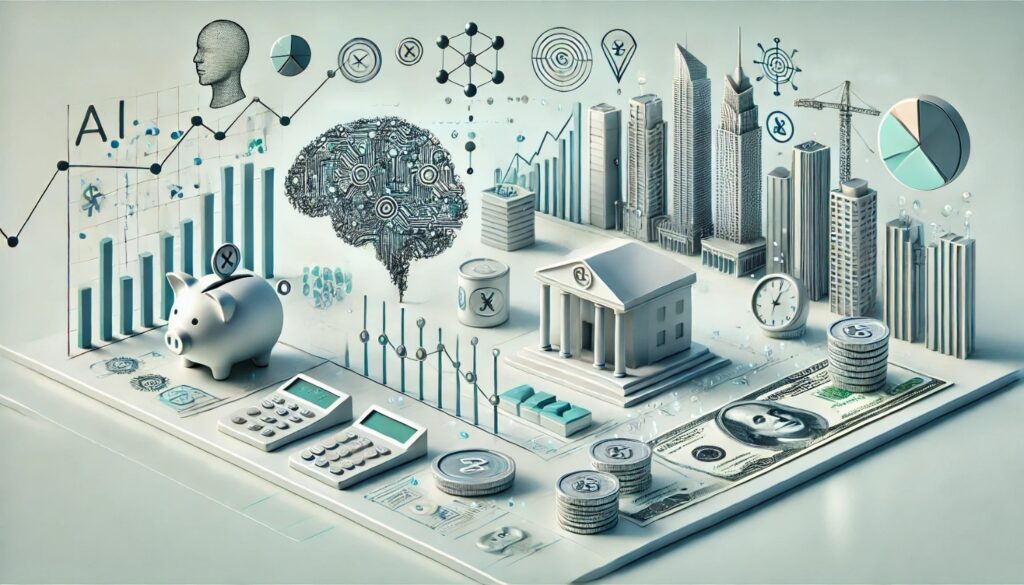
Generative AI is revolutionizing the finance sector by automating complex tasks, enhancing decision-making processes, and improving customer interactions. Here’s how generative AI is shaping the future of finance:- Automated Financial Processes:
Generative AI significantly streamlines financial operations such as data entry, transaction processing, and compliance checks. By automating these routine tasks, financial institutions can reduce operational costs and minimize human errors. AI-driven systems like chatbots and virtual assistants are also being employed to handle customer inquiries and transactions efficiently, providing 24/7 service that enhances customer satisfaction. - Risk Assessment and Management:
Generative AI excels in analyzing vast amounts of financial data to assess risk in real-time. This capability is crucial for credit scoring, loan approvals, and fraud detection. AI models can predict default probabilities more accurately by analyzing transaction patterns, spending behaviors, and economic trends. In fraud detection, AI systems are trained to recognize patterns indicative of fraudulent activities, thereby enhancing the security of financial transactions. - Algorithmic Trading:
In the realm of investments, generative AI is used to automate trading decisions. These AI systems analyze market data to identify trading opportunities based on historical trends and predictive modeling. This allows for high-frequency trading that can capitalize on minute market movements, potentially generating higher returns at a speed and volume that would be impossible for human traders. - Personalized Financial Advice:
Generative AI also plays a pivotal role in personal finance management by providing customized advice based on individual financial data. AI tools analyze users’ spending habits, savings, and financial goals to offer tailored recommendations for budgeting, saving, and investing. This personalized advice helps individuals optimize their financial health and make informed decisions about their financial future.
- Automated Financial Processes:
- Manufacturing and Product Design:
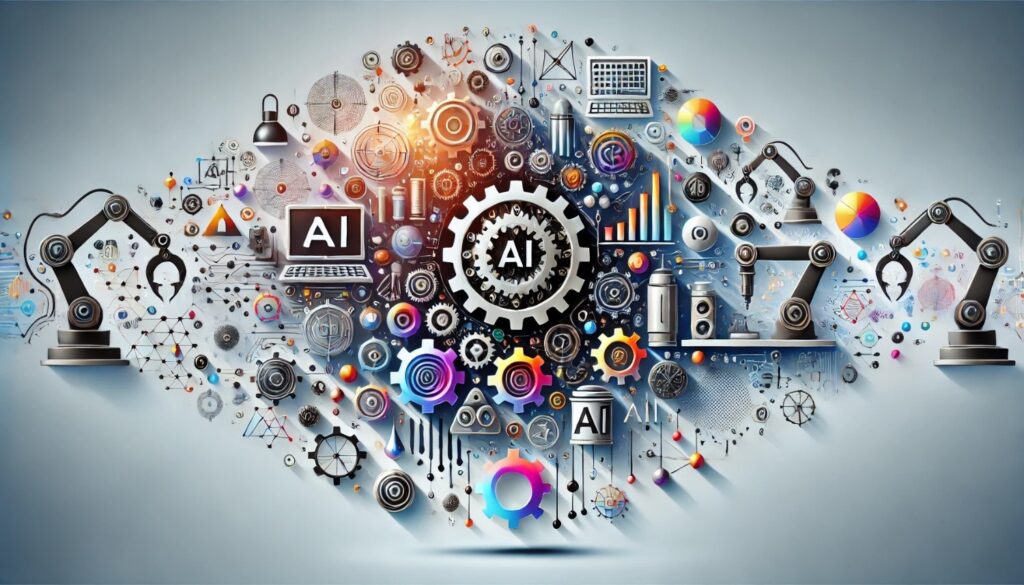
In manufacturing, generative AI facilitates the design of products through generative design algorithms. These algorithms simulate countless design iterations to identify optimal solutions that balance various constraints and objectives, such as material use, durability, and production cost. Here’s how it’s reshaping these sectors:- Streamlined Product Design:
Generative AI enables designers to explore a vast array of design alternatives quickly. By inputting design goals and parameters, such as material types, durability requirements, and cost constraints, AI systems can propose optimized designs that meet specified criteria. This not only accelerates the design process but also pushes the boundaries of innovation, allowing for the creation of products that were previously unfeasible due to complexity or manufacturing limitations. - Customization at Scale:
AI-driven systems excel at handling complex customer data to produce personalized products. For instance, in industries like automotive or consumer electronics, generative AI can tailor products to individual preferences or needs without significant disruptions to the production process. This capability enables manufacturers to offer bespoke products at a scale and speed that traditional methods cannot match. - Improved Prototyping Efficiency:
Generative AI significantly reduces the time and material costs associated with prototyping. AI algorithms can simulate the performance of a design under various conditions before a physical prototype is ever built. This “digital twin” technology allows for rapid iterations and adjustments, drastically cutting down development timelines and enhancing the final product’s quality. - Advanced Materials Development:
AI is also being used to discover and develop new materials. By predicting the properties of materials based on their chemical composition, AI helps in identifying novel materials with desirable properties faster than traditional experimental approaches. This advancement is particularly impactful in industries where material properties are critical, such as aerospace, where lighter and stronger materials can lead to significant performance gains.
- Streamlined Product Design:
- Decision Making and Planning:
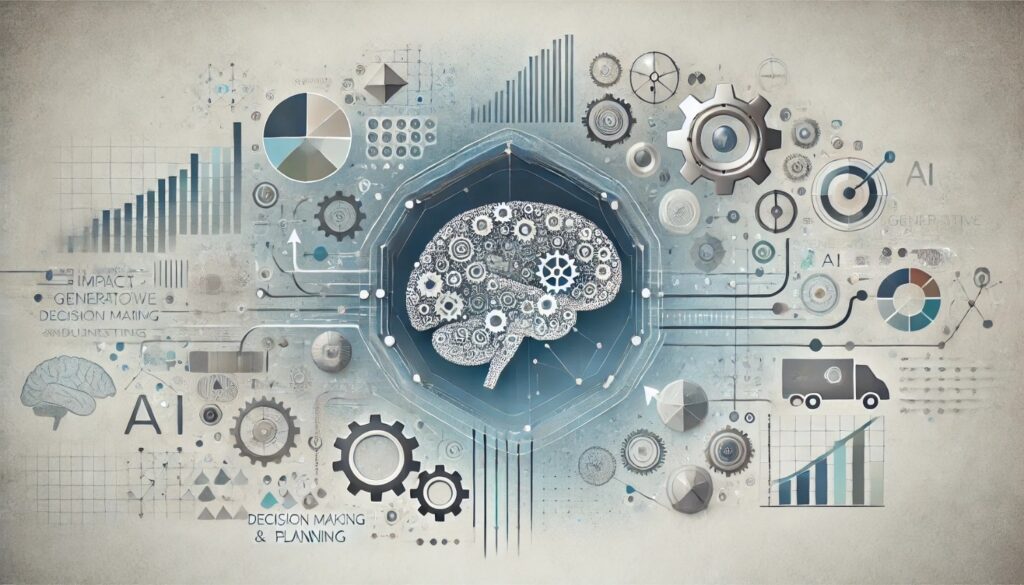
Generative AI improves decision-making processes by simulating outcomes and generating data-driven insights. Here’s how it’s being applied:- Strategic Business Decisions:
AI models analyze market trends, consumer behavior, and economic indicators to provide businesses with insights that inform strategic decisions. For instance, AI can forecast market demand for products, identify emerging market opportunities, or suggest adjustments to product lines or marketing strategies based on shifting consumer preferences. - Optimized Resource Allocation:
In sectors like manufacturing, where resource allocation is crucial, AI algorithms predict machine failures, maintenance needs, and production bottlenecks. This predictive capacity allows businesses to allocate resources more efficiently—minimizing downtime and maximizing productivity by ensuring that equipment and personnel are optimally deployed. - Enhanced Supply Chain Management:
AI dramatically improves supply chain efficiency by forecasting supply needs, optimizing delivery routes, and predicting potential disruptions. For example, AI systems can analyze weather data, traffic patterns, and supplier performance to dynamically adjust logistics strategies, ensuring that supply chains are both resilient and cost-effective. - Risk Management:
AI’s predictive capabilities are pivotal in risk assessment and mitigation strategies. By analyzing historical data and current market conditions, AI can identify potential risks and suggest preventative measures. This application is crucial in finance, insurance, and cybersecurity, where understanding and mitigating risk are essential to maintaining stability and security. - Financial Planning and Analysis:
Generative AI aids organizations in financial planning by automating budget forecasts, expense tracking, and financial reporting. AI algorithms provide real-time financial insights, allowing businesses to make informed decisions quickly and to adjust financial strategies promptly in response to market changes.
- Strategic Business Decisions:
- Automation and Efficiency:
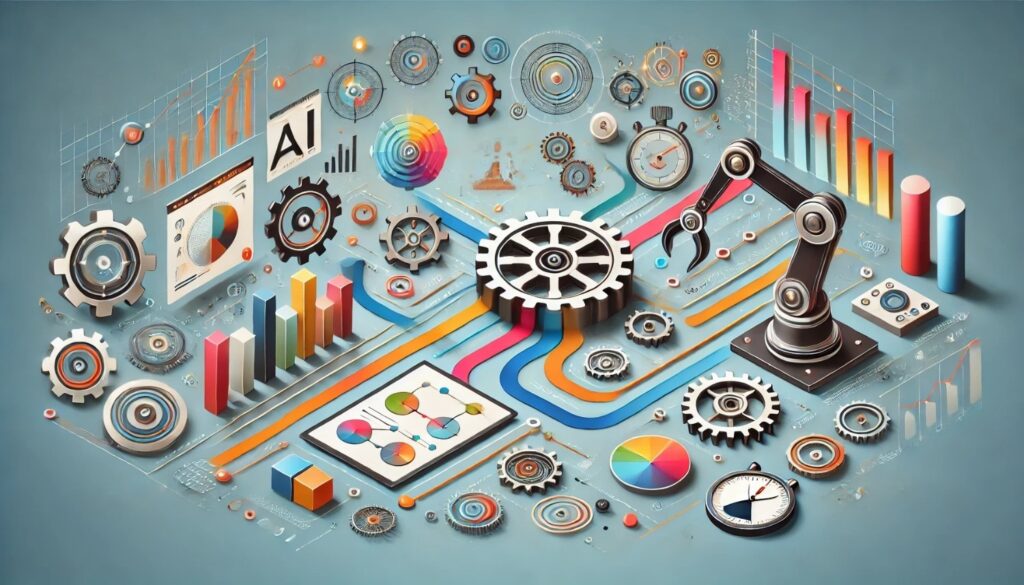
Generative AI is a cornerstone in the quest for greater automation and efficiency across numerous industries, fundamentally reshaping workflows and processes. Here’s a detailed look at how generative AI enhances automation and improves efficiency:- Manufacturing Precision:
Generative AI plays a pivotal role in manufacturing by enabling precise control over production processes. AI-driven robots and machines carry out tasks with a level of accuracy that far exceeds human capabilities, especially in environments that demand exactitude, such as the assembly of electronic components or the cutting and shaping of materials in automotive manufacturing. This precision not only improves the quality of the final products but also minimizes waste and reduces the need for rework. - Predictive Maintenance:
One of the standout applications of generative AI in automation is predictive maintenance. AI systems analyze data from machine sensors to predict failures before they occur, scheduling maintenance only when necessary. This proactive approach prevents downtime, extends the life of equipment, and optimizes maintenance schedules, thereby saving costs and boosting operational efficiency. - Optimizing Supply Chains:
Generative AI transforms supply chain management by predicting demand patterns, optimizing inventory levels, and identifying the most efficient delivery routes. It can simulate various scenarios to find the best strategies for logistics, taking into account factors like weather conditions, traffic, and supplier reliability. This level of sophistication not only ensures that products are delivered on time but also reduces transportation costs and minimizes environmental impact. - Enhancing Decision-Making:
Generative AI aids in decision-making by providing simulations and forecasts that help leaders make informed choices. For instance, AI can model financial scenarios to guide investment decisions or simulate market conditions to aid in strategic planning. This predictive power ensures that businesses are not only reacting to current conditions but are also prepared for future challenges and opportunities. - Energy Efficiency:
In industries like utilities and real estate, generative AI optimizes energy use to enhance efficiency and sustainability. AI systems can predict peak load times and adjust energy consumption accordingly or manage heating and cooling systems to maximize comfort while minimizing energy use. This not only helps reduce operational costs but also contributes to broader environmental sustainability efforts.
- Manufacturing Precision:
Sectors Covered by Amlgo Labs
Amlgo Labs provides generative AI services across several key sectors:
- Banking and Finance: We offer AI-driven solutions for financial forecasting, risk assessment, fraud detection, and personalized financial services.
- Manufacturing: Our generative design tools help in creating optimized product designs and improving manufacturing processes.
- Automotive: We use generative AI to design and simulate automotive components, enhancing performance and safety.
- Healthcare: Our AI solutions aid in drug discovery, medical data synthesis, and the development of personalized treatment plans.
Tools & Techniques
Amlgo Labs employs a wide range of tools and techniques in our generative AI projects:
- ETL Workflows and Databases: Oracle, Databricks, MySQL, PostgreSQL, MongoDB, Snowflake, Apache Spark, Scala.
- Data and App Hosting/Design: Azure, AWS, Google Cloud, Node.js, Angular, React.
- Data Science and Analytics: Python, XGBoost, TensorFlow, RStudio, Colab, IBM Watson, Keras, OpenCV, OpenAI, LLaMA, Mistral AI, LangChain.
- Visualization and Storytelling: Power BI, Tableau, Qlik, Google Data Studio, Apache Superset.
- Project Management: Waterfall, Scrum, Azure DevOps, Jira, GitHub.
Data Privacy and Integrity Compliance

At Amlgo Labs, we prioritize data privacy and integrity. Our compliance measures include:
- Adherence to Regulations: We strictly adhere to relevant data protection laws, such as GDPR and HIPAA, ensuring all data handling practices are legal and ethical.
- Data Encryption: We utilize advanced encryption methods to secure data both at rest and in transit, protecting against unauthorized access and breaches.
- Access Controls: Our stringent access controls ensure that only authorized personnel can access sensitive data, preventing unauthorized use and data leaks.
- Regular Audits: We conduct regular audits to assess compliance with data privacy standards and identify potential vulnerabilities, continuously improving our security measures.
Conclusion
Generative AI is reshaping the landscape of technology and industry. At Amlgo Labs, we are at the forefront of this transformation, leveraging advanced generative AI tools to drive innovation and efficiency in sectors like banking, finance, manufacturing, automotive, and healthcare. By adhering to strict ethical guidelines and prioritizing data privacy and integrity, we ensure that our AI solutions are not only effective but also responsible. As generative AI continues to evolve, we remain committed to exploring new possibilities and delivering cutting-edge solutions to our clients.
If you want to know how nvidia is leading a revolution in tech industries.
